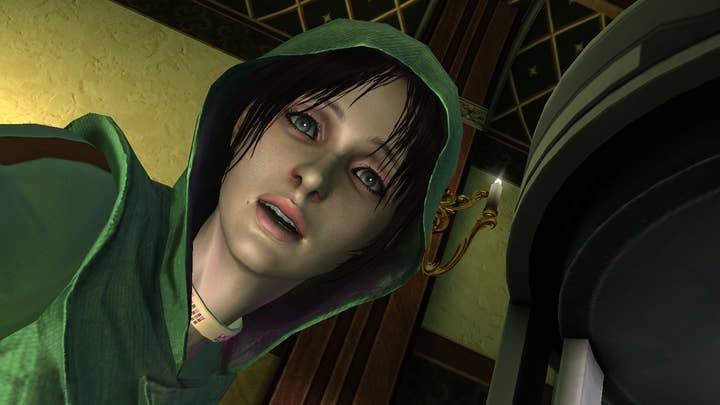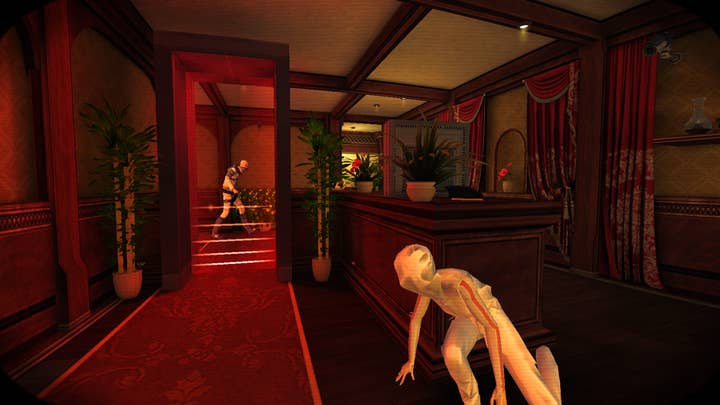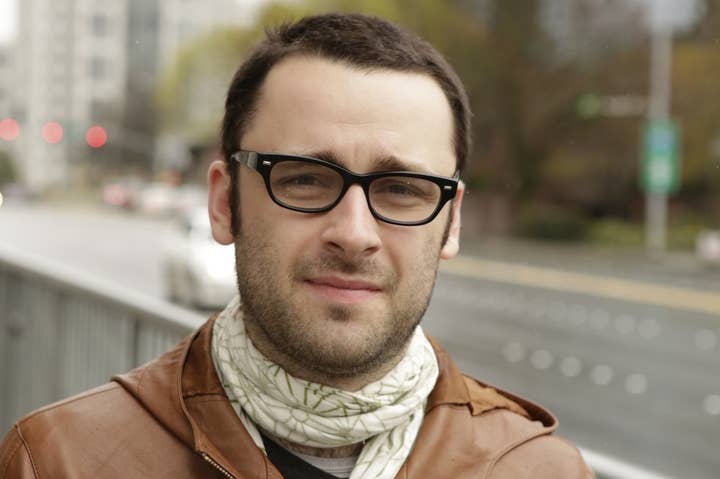Hope Springs Eternal: Can Mobile Offer a Console Experience?
Ryan Payton on developing République, going episodic and why F2P is "manipulative, evil and anti-consumer"
This Thursday, Ryan Payton - of Metal Gear Solid and Halo 4 fame - will launch his Kickstarter-funded stealth-action title République on iOS. Payton and his studio Camouflaj are aiming to revolutionize the mobile games space with an offering that showcases console-like gameplay and story on the small screen, but without the complexity that a controller inherently brings.
Payton, who is very much against the free-to-play option, has chosen an episodic model for République. The first episode is five dollars and the first season of five episodes can be had for $15, which is 25 percent off the total.
The game itself puts players in control of surveillance cameras, which must be put to good use to aid the main character, Hope, in escaping from an Orwellian state. The 1984-inspired title is planned for PC and Mac next year as well.
In the interview below, Payton chats with GamesIndustry International about the challenges of building a game for mobile that will appeal to console players, how smartphones need to be Trojan Horses for the games business, and why free-to-play is wrong for Camouflaj.
That's a good question. It's true that we're trying to push the iOS platform towards a more console-like experience, but I can't claim that République is the first to attempt this. I clearly remember lying in bed playing Infinity Blade in bed on December 9, 2010. It really opened my eyes to what was possible, not only with the iOS hardware, but what's possible with touchscreens. From that moment forward, I started doing mental exercises on how to bring the things I love about console gaming to these smaller devices.
"These devices are the true Trojan Horse gaming devices, now it's up to us developers to be smart about how we design our games for them"
I also clearly remember bringing Metal Gear Solid 4 home and showing it to my family. They were enthralled by the opening sequence, but when it came time to play, they just couldn't wrap their heads (and hands) around the 17-button controller. People were shouting out commands like “press and hold X!” and “Hold L2 and then press R2 to fire!” It was a disaster.
I love games and I believe in how transformative of an entertainment medium they can be, and I believe that the global appeal of games have been stunted in recent years by expensive, dedicated machines and overly complex controllers. While experiencing video games will never be as simple as sitting down in a theater and watching a film, I think that games designed specifically for touchscreens are the way we get hundreds of millions of people playing. A number of popular mobile games have already proven this.
In short, we should be thinking of ways to expand our appeal beyond the 10 or 20 million people who buy NBA2K and Call of Duty every year, and be leveraging the global adoption of smartphones and tablets so more games reach the 300 million-player mark. These devices are the true Trojan Horse gaming devices, now it's up to us developers to be smart about how we design our games for them. It's up to us to define what gaming experiences are best for phones and tablets.

I've been a big believer in game voiceovers ever since I played the original Metal Gear Solid, so you can imagine what an honor it was to work with the voiceover director (Kris Zimmerman Salter) and the franchise voice cast on Metal Gear Solid 4. It was incredible to see, first hand, what they brought to the game.
So when we started development on République back in 2011, I knew that I wanted to work with the Metal Gear voice talent again, no matter the budget or what form our mobile project would take. Not only are Kris Zimmerman Salter, Jennifer Hale, David Hayter and Khary Payton extremely talented, they are also great and supportive friends.
I don't think the whole idea of bringing voiceovers to mobile is as radical of an idea today as it was back in 2011, but the idea of doing facial capture for a mobile game still surprises people. In addition to doing motion capture for all our cinematics, we've partnered with Faceware Technologies to power the facial performance in République. Thankfully, our talent like Jennifer Hale and Rena Strober were totally committed to it. We knew from the very beginning that we had to nail voiceovers and facial performance, because the whole fantasy of the game is about Hope calling players on their iOS device…
"Camouflaj may never be valued at a billion dollars, but I can also sleep at night knowing we're not manipulating people into spending hundreds of dollars for something that is clearly not really worth it"
A lot went into our decision to go episodic. While we've always felt good about the PC marketplace, we spent a year debating internally how we would monetize the game on the App Store. Many of our friends and industry colleagues warned us against premium pricing on the App Store, as consumers have shifted to the free-to-play model and hesitate to pay upfront for anything, even if it's 99 cents. Forget about charging $9.99 for the whole thing like we initially envisioned.
Around springtime, we looked at what we had developed: a high quality, five-chapter, 10-15 hour game. We knew there was no way we could market the game for $10 or more on the App Store, which is why we were really excited to see the success Telltale was having with its episodic model on the App Store. That's when we started to explore the idea of selling the game as $4.99 individual chapters with a $14.99 season pass.
That said, we're still trying to pave our own way with République. For starters, we've added a lot more value to the season pass with an exclusive interactive developer commentary feature and exclusive chapter of our making of video. We also guarantee players early access to Episode 2, which is a great value add.
In terms of the actual development of the game, I'm excited about what the episodic model will mean for the overall quality of the game. République is not 100 percent linear, meaning that we will be updating previous content with the release of each new episode. Not only does this mean we'll be finding and fixing more bugs, but it also means we'll be improving the overall design and performance of the game across all devices. I'm really excited to see and feel how Episode 1 plays when Episode 5 launches. This idea of continuous updates is something I've always enjoyed about the Infinity Blade series, and it's something we intend to double-down on with République.
We explored the idea of free-to-play for a few weeks, but ultimately decided it didn't make sense for our initial release. We actually have a number of systems in the game that are compatible with free-to-play, but we don't charge any real-world currency for them. To our F2P friends, they'll just cringe when they see that…
Personally, I really struggle with free-to-play. There are a handful of free-to-play games that I like and respect, but for the most part, I think they are manipulative, evil and anti-consumer. I personally don't want to be a part of this rush to squeeze as much money out of consumers as possible. The bigger companies are literally milking hundreds of thousands of dollars out of some players, and in my opinion, that sort of business should stay in Las Vegas.
Camouflaj makes high quality games - we'll charge you up front, and then you can do whatever you want with it without fear of being nickel and dimed. Camouflaj may never be valued at a billion dollars, but I can also sleep at night knowing we're not manipulating people into spending hundreds of dollars for something that is clearly not really worth it.
That's not to say that République doesn't have any IAP, though. We have our $14.99 season pass, and we also charge players for extra content like the making of video, the soundtrack and our ancillary fiction iBook.
I'm still a believer in the premium model on the App Store, and I'm happy to see December filled with a lot of great premium games like The Room Two, Skulls of the Shogun, and San Andreas. I hope this trend continues. I hope consumers show up.
In the future, I want to explore new methods of monetization that has some of the merits of free-to-play (try before you buy, anti-piracy), but for right now, we're excited about our episodic approach.
Kickstarter is the best thing that happened to Camouflaj and the République project - not only was the funding extremely helpful, but we've really benefited from having a community of eleven thousand fans there to keep us excited and honest.
I'm really interested in seeing how Kickstarter evolves in 2014. I think it's still a great platform for getting your game funded, especially now that consumers are wiser and can detect BS when they see it.
One of the biggest things that influenced me with my Metal Gear experience was that team's relentless commitment to quality. It didn't matter if it was the game, a trailer or a TGS pamphlet - the team fought hard to make sure everything was delivered at the highest level of quality. This is something I've been trying to instill in Camouflaj with everything we do.
"We have the same broad-scope aspirations for this game as other, more established studios have for their huge, next-gen console IPs"
I think my experience at Microsoft better prepared me for developing a totally new game for a relatively new platform. In the early days of Halo 4, we were in an extended blue-sky pre-production period that got me thinking of radical new ways to play. We were also part of early Kinect meetings, which trained my brain to consider new input methods.
Despite my experience on Halo and Metal Gear, nothing could have truly prepared us for what we embarked upon: two years designing a console-like 3D action game that takes the 17-button controller experience and distills it down to one touch. No gimmicks, no rails, no virtual joysticks. I'm super proud of what we've accomplished, especially because there was no roadmap and no other iOS games to take inspiration from. This was both extremely exciting and scary.
By beginning this journey on mobile, we're able to expand on the République brand in a way that's contextual, that feels driven by the objectives and desires of the game's characters. Since our story begins with a desperate phone call from Hope, it's fitting that we establish the game on mobile devices first. In the case of our iBook, the République Manifesto, it's our strategy guide, but it also features heavily into République's story, right up front in Episode 1. In fact, our character, Zager, the revolutionary, has taken the Overseer's Manifesto, the bible which all subjects in the game world must carry with them, and written hints on how to escape in the margins of its pages. The fictional strategy guide for Hope becomes a real-life strategy guide for the player.
Going forward, we have the same broad-scope aspirations for this game as other, more established studios have for their huge, next-gen console IPs. Our beginnings are, perhaps, more humble than others, which only serves to fuel our ambitions as industry underdogs.

Whether we are featured by Apple is obviously up to them, and they do a great job of spotlighting quality. It's been our approach to just ship the best game possible and then hope for the best. We also have the added benefit of our Kickstarter community and an IP that millions of people are aware of thanks to our dramatic crowdfunding campaign last year.
We are all very competitive people, and we haven't batted an eye when we look to the other competition on the App Store. At the end of the day, quality will win out, and we're very confident that République will be one of the best games on the App Store this Christmas.
This has been our vision since day one, and we've partnered with dozens of people and studios to make République a reality. We've all got a lot invested in this game, and we're proud that we've been able to achieve our ambitious vision. In a way, we're just getting started though - we have more episodes to deliver, and we're still developing the desktop version of the game. 2014 is going to be a very exciting year for us, but it all starts on December 19!

